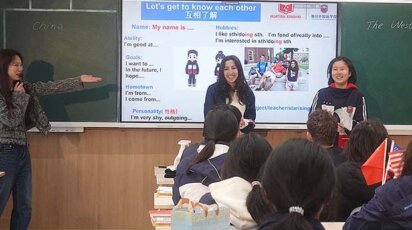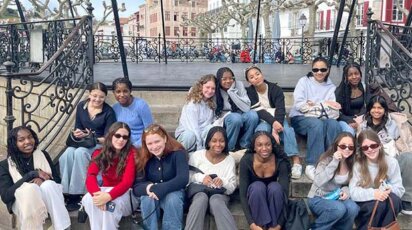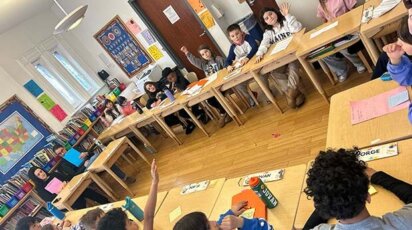News
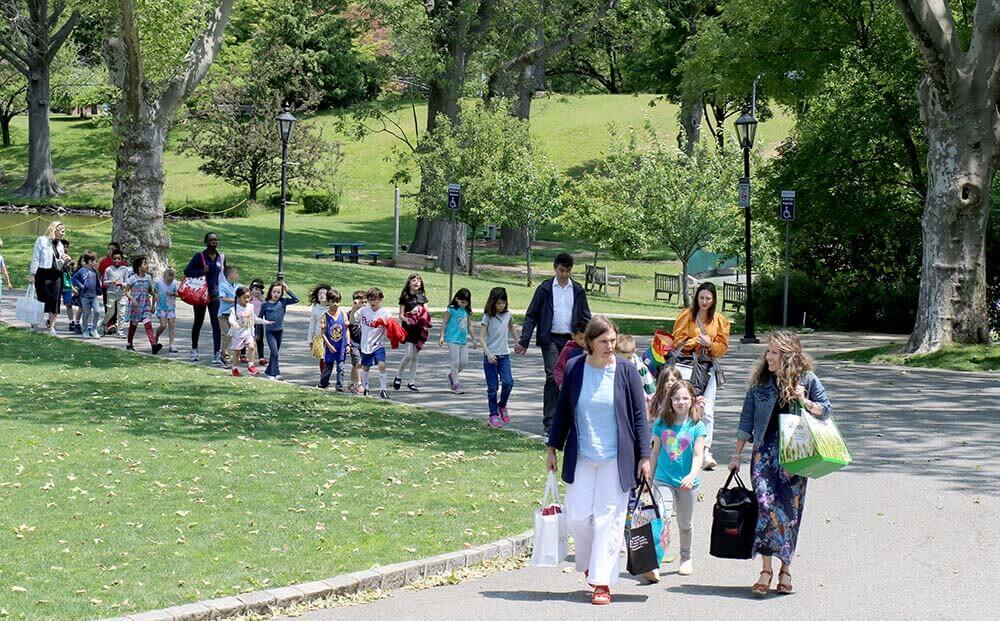
It was such a joy to watch ninth graders and first graders writing poems together on the hillside near the ponds on the Dyker Heights campus. Using prompts such as flower, cloud, swings, or bench they crafted poems inspired by what they saw around them.
Upper School English teacher Julia Edwards explained, “As part of our poetry unit earlier this semester, the ninth grade English students wrote poems to pen pals in Poly’s Lower School.” On May 30, the first grade students and teachers arrived for a pizza lunch in the Blue Devil Deli and poetry exchange between the pen pals.
Lower and Upper School Students Become Pals
“The seed of this project,” Edwards said, “was actually planted a year ago, when I was filling in as an associate teacher at the Lower School for Josie Paul‘s first grade class. The students were working on their poetry unit, and I was so impressed by their natural aptitude for poetic thinking and writing. My background is in poetry, so when I became an English teacher at the Upper School, I reached out to Susie Brandmeyer, Josie, and the first grade team to see if they would be interested in collaborating on a pen pal project.” The Lower School teachers loved the idea. The ninth graders wrote original poems for their Lower School buddies and their letters were delivered with hand-written notes.
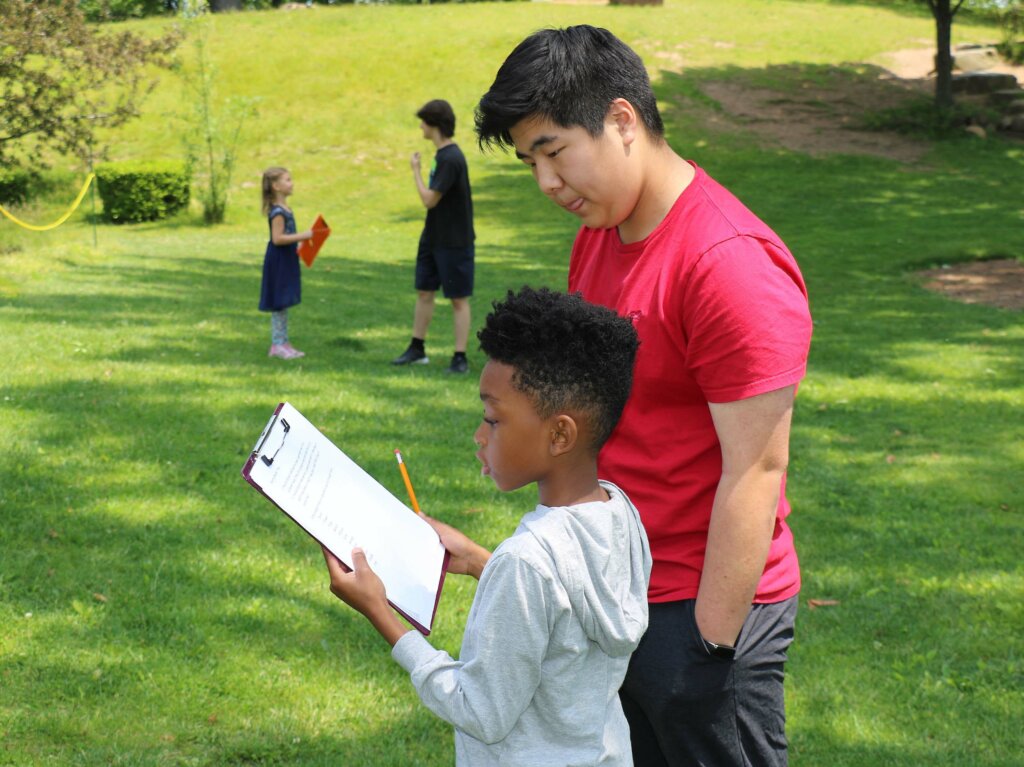
The Poetry Pals Meet
Ninth graders were eagerly waiting in the Blue Devil Deli for their guests. The younger students walked in and met their pen pals for the first time. Pizza helped to break the ice and start the conversation.
“It surprised me how fast the children warmed up to us,” said Beckett Zrihen ’26. “It was clear at first that they were a little scared and overwhelmed, but after about 10 minutes they were fully comfortable and excited to be at the Dyker Heights campus.”
The Writing Begins
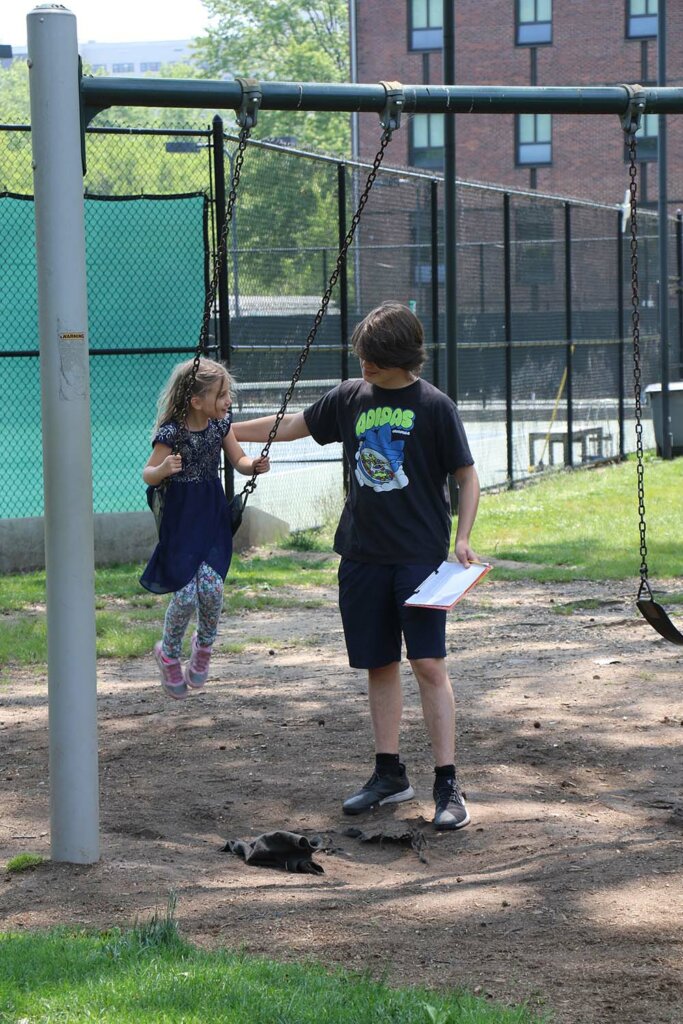
After lunch, each pair of poetry buddies headed out to the pond area with clipboards and directions to: “Find an object and write how a poet might see it in a different way.” Then they were to: “Find an object and write a sensory poem about it.” On such a beautiful May day, it was easy to find a tree, pond, flower, or clouds to spark the imagination.
“I really enjoyed being able to share the Poly campus with all the first graders,” said Zrihen. “I really enjoyed how the students were so passionate about all the activities we were doing. My student was adamant that we should finish her poem before we went to play on the playground.”
Perspectives
“The best part about meeting the first graders,” Sylvie Dorsch ’26 said, “was looking at how they see our campus. We helped them write poems about things they saw in the playground, and they noticed a lot of things I don’t normally look at when I am on campus. They stopped to look at all of the turtles and even the way the pond moved. This was also the most surprising thing for me.”
Sensory Poems
One first grader wrote the beginning of a sensory poem about pollen, something many people can relate to and noting it “feels like a pillow” and that a “flower doesn’t make any noise.”
Another child working on a sensory poem wrote about a sprinkler: “It feels like rain and it feels like a hot shower and it feels like a storm.”
“Both grades were very thoughtful, making discoveries and having fun together. It was a special and heartwarming experience!”
“I was so pleased to see the ninth graders and first graders really listening and learning from one another,” Edwards commented. “The Lower School buddies, who were a little shy at first, quickly became comfortable taking charge of the writing activity, observing objects around the pond and sharing what they knew about sensory writing. The ninth graders helped them navigate the beautiful campus and shared poetic strategies we have studied throughout the year. Both grades were very thoughtful, making discoveries and having fun together. It was a special and heartwarming experience! We hope to continue the poetry share next year as well, and for the buddies to keep in touch throughout their time at Poly.”
Two Poems by Ninth Graders
Park Slope Diptych
by Sylvie Dorsch ’26
The park outside is lush and green,
beginning to recover from the harsh winter.
Go out and play!
So we play for hours.
Two cafés on Prospect Park West crank open the windows.
They cultivate joy and connection.
Here, there’s a dog on every corner, waiting patiently for their owner.
Here, there’s a store for everyone to enjoy.
Moms sit on stoops and divulge gossip.
The old man on Windsor takes a leisurely
walk each day at noon. But he always carries a cane.
I yearn for summer’s warm embrace.
Looking out through my window, at the people I share streets with.
Shiny skin, brows furrowed.
The sun gleams above 7th Avenue.
School drifts away. Once more, kids fill the streets.
How time slips quickly away.
How the seasons bolt faster than light.
How does this town feel the same, years later?
Neighbors garden in their backyards, waiting for the plants to flourish.
Grandparents meet grandchildren in penthouses of tall apartments.
Couples go on strolls and grow old.
The sun rises, and then it sets.
The moon slides in and takes its place above our home.
Viejito Houses
by Felipe Santiago ’26
When I was little dad would drive me everywhere
From home to school to baseball practice
And back again
To here and over there
And as I sipped joyfully on my strawberry milk
Even though I was intolerant to lactose
I smiled gleefully as the spring blew away the frost
And the plants shedded their wilt
And as my dad drove me in a great city of which my young mind was lost
Where my eyes would tilt, spin, and sputter
And my imagination, a monarch, would be free to flutter
A mariposa it was but now no longer
For as I looked upon the tall, brown viejito houses
standing tall like pillars
I gained a new currency named
Memories
A type of currency that would never leave me
And now as I look back
I wish I could return
To when life was simpler and every mistake was not scorned
And now as I grow up and my dad tells me stories of Reggie Miller
I begin my de-metamorphosis
Into a caterpillar
I do this so that we can make the times simpler
Oh and how much do I yearn
And those times do I miss
When I would learn easily
And in our teasing we
would call each other dumb names
And poke fun at one another’s mother
The jokes albeit were fun yet crude
But that time has passed
It was but a period in our life yes only one
And now as I look back
Upon the viejito houses
I do not pity myself or say ay bendito
But rather now I realize
That through the viejitos’ eyes is how I
see

